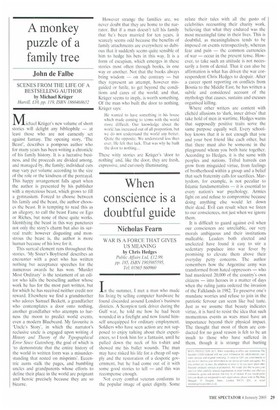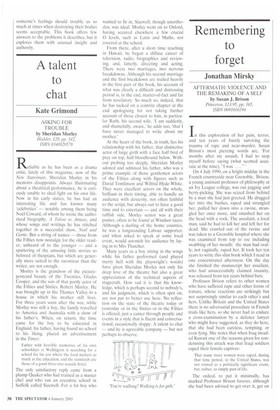When conscience is a doubtful guide
Nicholas Fearn
WAR IS A FORCE THAT GIVES US MEANING by Chris Hedges
Public Affairs Ltd, £12.99,
pp. 185, ISBN 1903985595,
Tel: 01865 860960
In the summer, I met a man who made his living by selling computer hardware he found discarded around London's business districts. A Scorpion tank driver during the Gulf war, he told me how he had been wounded in a firefight and now found himself unequipped for ordinary employment. Soldiers who have seen action are not supposed to enjoy talking about their experiences, so I took him for a fantasist, until he pulled down the neck of his t-shirt and showed me his bullet wounds. The man may have risked his life for a cheap oil supply and the restoration of a despotic government, but he had come out of it with some good stories to tell — and this was recompense enough.
Not every combat veteran conforms to the popular image of quiet dignity. Some relate their tales with all the gusto of celebrities recounting their charity work, believing that what they endured was the most meaningful time in their lives. This is doubtful, as meaningfulness tends to be imposed on events retrospectively, whereas fear and pain — the common currencies of war — occur in the present tense. However, to take such an attitude is not necessarily a form of denial. That it can also be affirmation is what has driven the war correspondent Chris Hedges to despair. After a career spent reporting on conflicts from Bosnia to the Middle East, he has written a subtle and considered account of the mythology that causes, sustains and excuses organised killing.
Where other writers are content with cliched allusions to 'dark, inner drives' that take hold of men in wartime. Hedges warns that supposedly positive traits serve the same purpose equally well. Every schoolboy knows that it is not enough that you and your best friend like each other, but that there must also be someone in the playground whom you both hate together. According to Hedges, it is the same with peoples and nations. Tribal hatreds can grow from misguided virtue, from feelings of brotherhood within a group and a belief that such fraternity calls for sacrifices. Martyrdom, for example, is not peculiar to Islamic fundamentalists it is essential to every nation's war psychology. Armies fight on and refuse to compromise because doing anything else would let down their dead. Evil can result when we listen to our consciences, not just when we ignore them.
It is difficult to guard against evil when our consciences are unreliable, our very morals ambiguous and their institutions malleable. Leaders both elected and unelected have found it easy to stir a sedentary populace into war fever by promising to elevate them above their everyday petty concerns. The author remembers how the Argentine army was transformed from hated oppressors — who had murdered 20,000 of the country's own citizens — into heroes in a matter of days when the ruling junta ordered the invasion of the Falklands in 1982. To preserve one's mundane worries and refuse to join in the patriotic fervour can seem like bad taste. Just as we assume that beauty indicates virtue, it is hard to resist the idea that such momentous events as wars must have an importance beyond their physical impact. The thought that most of them are conducted for no good reason is felt to be an insult to those who have suffered in them, though it is strange that hurting
DATA PROTECTION ACT. Whet, respondinv to offers and promotions. The Spectator 11828) Limited will use your informatton for administration. Loss renter services and targeted marketing. In order to fulfil our commilineuts TO you we win disclose your information to am service provident and agents. We may CerrOaCt yOu by mad, fax telephone Or omen to let you knew about ether Spectator products. SMiCti or priatnettousi We would also like to pass your itietui:s in other candidly selected organisattons in °roes that they can otTer you inforrturion. goods and ser.tices that may be of interest. If you would prefer [bat yaw details ate not passed to such organisations, pleasa write to The Data Manager. be Doughty Strmt. London WC t 21.L. or cmail datamanager(i.tispectatoreottk
someone's feelings should trouble us so much at times when destroying their bodies seems acceptable. This book offers few answers to the problems it describes, but it explores them with unusual insight and authority.



















































 Previous page
Previous page